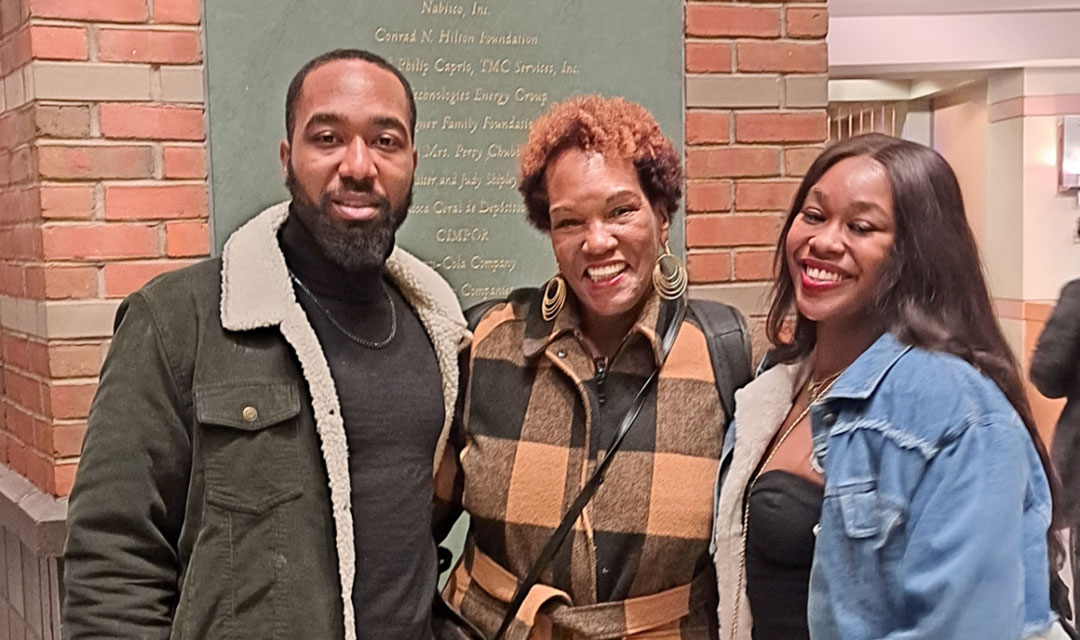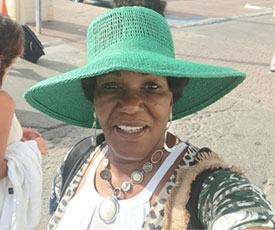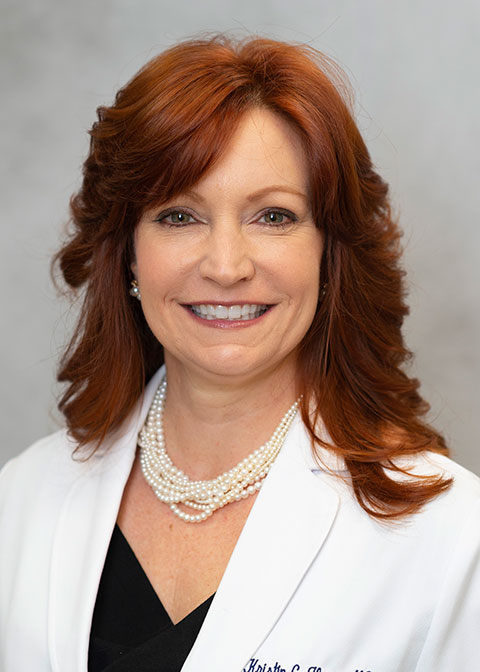“It’s a great program, and I am enjoying it. The staff is just wonderful, so helpful.”

When it comes to bettering her health, retiree Pamela Ghee is embodying the same traits of resilience and determination she had while serving in the U.S. Army Reserves for 31 years as a comptroller, retiring as a Lieutenant Colonel and as a school counselor for over 30 years.
In particular, Pamela shares that it was years of smoking that has put her in her current predicament, resulting in a variety of health issues.
“I was coughing like crazy, and my excuses were that I had a cold, or that it was my allergies, but I knew it was neither. I knew I had to stop smoking. It was getting ridiculous,” said Pamela. “After quitting, I really started to realize the health effects.”
Over the course of the past few years, Pamela noticed she had severe shortness of breath, which led to requiring a cardiac stent. This stent helped, but Pamela still was feeling short of breath. After undergoing multiple medical evaluations to make sure nothing was wrong, Pamela underwent a pulmonary function test. It turns out the stent was fine, but results showed that her Chronic Obstructive Pulmonary Disease (C.O.P.D.) was going to require her to need pulmonary rehabilitation.
A Pathway to Improved Quality of Life
 Veterans Affairs (VA) recently set her up with The Pulmonary Rehabilitation Program at Cooperman Barnabas Medical Center (CBMC), accredited by the American Association of Cardiovascular and Pulmonary Rehabilitation (AACVPR), which offers patients an educational and supportive program monitored by trained medical professionals.
Veterans Affairs (VA) recently set her up with The Pulmonary Rehabilitation Program at Cooperman Barnabas Medical Center (CBMC), accredited by the American Association of Cardiovascular and Pulmonary Rehabilitation (AACVPR), which offers patients an educational and supportive program monitored by trained medical professionals.
Linda Hardy, BBA, RRT-NPS, RPFT, AE-C, respiratory therapist at The Pulmonary Rehabilitation Program at CBMC explains that the program is designed to aid people with breathing problems maintain and improve the quality of their lives. Through early intervention and individually planned and designed education, therapy, exercise, motivation and lifestyle adjustment programs, patients can once again take control of their daily activities and lives.
“Our program is customized based on the unique needs of the patient,” shares Linda. “Our patients can expect to work one-on-one with a licensed respiratory therapist, who will help them develop their own goals.”
Pamela speaks fondly of her experiences since she started. “Linda Hardy was and is wonderful, everybody I work with is. Linda was my intake person and she was the one that determined my oxygen level was dropping while I was just walking and helped get me all set-up and started with their pulmonary rehabilitation program.”
As for the exercise program, Pamela continues to express her appreciation. “It’s a great program, and I am enjoying it. The staff is just wonderful, so helpful. In addition to Linda, I want to give a special thank you to her teammates, Lilly Earl, BBA, CRT, and Priya Mistry, RRT, as well. They push me to increase my workout, so that I can eventually workout without needing the oxygen.” Pamela says.
For Pamela, her goal is to use the treadmill without the oxygen, “If I can’t do the treadmill for the full 20 minutes at the pace I’m going with the oxygen, but I could do 10 minutes without it, then that would be a goal,” she explains.
Breathing Better, Living Better

“Pulmonary rehabilitation is also meant to teach patients various methods of minimizing symptoms of their pulmonary disease and recognizing early symptoms of declining health so they can work with their physicians to get the best treatment,” explains Kristin G. Fless, MD, Medical Director of Pulmonology Services and Chair of the Department of Medicine at CBMC.
“The staff at pulmonary rehab are teaching me really good breathing techniques and tips on how to breathe better and not overexert,” says Pamela. She finds this extremely beneficial because she loves to travel, and is involved in several community groups, church and different events where she is out and about.
“Right now, I have a travel backpack with oxygen and I take it with me regularly no matter where I am going. One of the keys is to walk slow, and if I do pick up pace and need to have the oxygen, then I just put it on and keep going.”
In the future, Pamela hopes to not need her oxygen backpack, and to be fully sufficient on her own from putting in the work at pulmonary rehab. Each session she pushes to get to that next level. If Pamela could share any other recommendation besides considering pulmonary rehabilitation if it might be beneficial, it would be to quit smoking!
“There are people I know with C.O.P.D. that were never smokers, but there are also a lot of people out there with C.O.P.D. as a result of smoking,” Pamela shares. “I know it’s difficult to quit smoking, but it is important to try the best you can, and really work at quitting. The damage shows up later in life, it doesn’t show up in your younger years when you’re having a good time. You get older and the damage is done and it’s irreversible.”
The Benefits of Pulmonary Rehabilitation for Lung Disease
While there is no cure for lung disease, the symptoms can be treated. Lung disorders can make it difficult to breathe, cause chronic coughing and cause persistent stress and anxiety. In the Pulmonary Rehabilitation program at CBMC, patients work to slow down and minimize the debilitating symptoms of lung disease through a combination of exercise, education, breathing retraining and nutritional counseling.
The Pulmonary Rehabilitation Program at Cooperman Barnabas Medical Center strives to help patients:
- Increase knowledge of your pulmonary disease and self-care management
- Increase ability to tolerate daily living activities
- Minimize symptoms associated with your pulmonary disease
- Recognize early symptoms of declining health
- Reduce need for hospitalization
For more information, please call our Pulmonary Rehabilitation specialists at Cooperman Barnabas Medical Center, 973-322-8926 or visit The Pulmonary Rehabilitation Program at Cooperman Barnabas Medical Center.